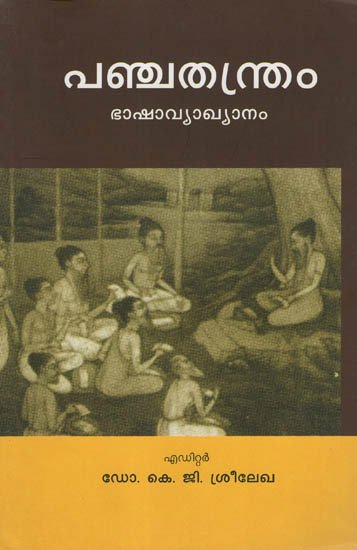Panchatantra [sanskrit]
by Dr. Naveen Kumar Jha | 2016 | 13,828 words | ISBN-13: 9788193077962
The Sanskrit edition of the Panchatantra referencing the English translation and grammatical analysis. Written by Vishnu Sharma and possibly dating as early as 1200 BCE, the Panchatantra (or Pancatantra) represents a collection of short stories teaching basic ethical values and moral conduct that was commonly practiced in ancient Indian. Alternative titles: Śrīviṣṇuśarman Pañcatantra (श्रीविष्णुशर्मन् पञ्चतन्त्र, Śrī-viṣṇuśarman pancatantra, श्री-विष्णुशर्मन्, Sri-visnusarman)
Verse 1.348
अशक्तैर् बलिनः शत्रोः कर्तव्यं प्रपलायनम् ।
संश्रितव्यो ऽथवा दुर्गो नान्या तेषां गतिर् भवेत् ॥ ३४८ ॥
aśaktair balinaḥ śatroḥ kartavyaṃ prapalāyanam |
saṃśritavyo 'thavā durgo nānyā teṣāṃ gatir bhavet || 348 ||
The English translation of Panchatantra Verse 1.348 is contained in the book The Complete Pancatantra: Sanskrit Text with English Translation by Dr. Naveen Kumar Jha. This book is not available online so in order to read the full text and translation you should buy the book:
Buy now! English translation by Dr. Naveen Kumar Jha (2016)
Glossary of Sanskrit terms
Note: This extracts Sanskrit terms and links to English definitions from the glossary, based on an experimental segmentation of verse (1.348). Some terms could be superfluous while some might not be mentioned. Click on the word to show English definitions.
Ashakta, Balin, Bali, Shatru, Kartavya, Prapalayana, Samshrita, Vya, Athava, Durga, Tad, Gati,
Analysis of Sanskrit grammar
Note: this is an experimental feature and only shows the first possible analysis of the Sanskrit text (Panchatantra Verse 1.348). If the system was successful in segmenting the sentence, you will see of which words it is made up of, generally consisting of Nouns, Pronouns, Verbs, Participles and Indeclinables. Click on the link to show all possible derivations of the word.
- Line 1: “aśaktair balinaḥ śatroḥ kartavyaṃ prapalāyanam ”
- aśaktair -
-
aśakta (noun, masculine)[instrumental plural]aśakta (noun, neuter)[instrumental plural]
- balinaḥ -
-
balin (noun, masculine)[nominative plural], [vocative plural], [accusative plural], [ablative single], [genitive single]balin (noun, neuter)[ablative single], [genitive single]balī (noun, neuter)[ablative single], [genitive single]
- śatroḥ -
-
śatru (noun, masculine)[ablative single], [genitive single]
- kartavyam -
-
kartavya (noun, masculine)[adverb], [accusative single]kartavya (noun, neuter)[adverb], [nominative single], [accusative single]kartavyā (noun, feminine)[adverb]√kṛ -> kartavya (participle, masculine)[accusative single from √kṛ class 1 verb], [accusative single from √kṛ class 2 verb], [accusative single from √kṛ class 5 verb], [accusative single from √kṛ class 8 verb]√kṛ -> kartavya (participle, neuter)[nominative single from √kṛ class 1 verb], [accusative single from √kṛ class 1 verb], [nominative single from √kṛ class 2 verb], [accusative single from √kṛ class 2 verb], [nominative single from √kṛ class 5 verb], [accusative single from √kṛ class 5 verb], [nominative single from √kṛ class 8 verb], [accusative single from √kṛ class 8 verb]√kṛ -> kartavya (participle, masculine)[accusative single from √kṛ class 3 verb], [accusative single from √kṛ class 6 verb]√kṛ -> kartavya (participle, neuter)[nominative single from √kṛ class 3 verb], [accusative single from √kṛ class 3 verb], [nominative single from √kṛ class 6 verb], [accusative single from √kṛ class 6 verb]
- prapalāyanam -
-
prapalāyana (noun, neuter)[adverb], [nominative single], [accusative single]
- Line 2: “saṃśritavyo 'thavā durgo nānyā teṣāṃ gatir bhavet ”
- saṃśrita -
-
saṃśrita (noun, masculine)[compound], [vocative single]saṃśrita (noun, neuter)[compound], [vocative single]
- vyo' -
-
vya (noun, masculine)[nominative single]
- athavā -
-
athavā (indeclinable)[indeclinable]
- durgo* -
-
durga (noun, masculine)[nominative single]
- nānyā -
-
- teṣām -
-
tad (noun, neuter)[genitive plural]sa (noun, masculine)[genitive plural]
- gatir -
-
gati (noun, feminine)[nominative single]gati (noun, masculine)[nominative single]
- bhavet -
-
√bhū (verb class 1)[optative active third single]
Other editions:
Also see the following editions of the Sanskrit text or (alternative) English translations of the Panchatantra Verse 1.348
Pancatantra of Visnusarman
by M. R. Kale (2015)
Panchatantra in Simple Sanskrit
by Dr. Vishwas (2016)
Panchatantram (Telugu)
by Tadanki Venkata Lakshmi Narasimha Rao (2020)
Published by J. P. Publications, Vijayawada; Throughout black & white Illustrations; 9788192053851.
Buy now!Preview of verse 1.348 in Telugu sript:
అశక్తైర్ బలినః శత్రోః కర్తవ్యం ప్రపలాయనమ్ ।
సంశ్రితవ్యో ఽథవా దుర్గో నాన్యా తేషాం గతిర్ భవేత్ ॥ ౩౪౮ ॥
Panchatantram Bhashavyakhyanam (Malayalam)
by Dr. K.G. Sreelekha (2010)
Published by the University of Kerala.
Buy now!Preview of verse 1.348 in Malayalam sript:
അശക്തൈര് ബലിനഃ ശത്രോഃ കര്തവ്യം പ്രപലായനമ് ।
സംശ്രിതവ്യോ ഽഥവാ ദുര്ഗോ നാന്യാ തേഷാം ഗതിര് ഭവേത് ॥ ൩൪൮ ॥
The Panchatantra Stories (Tamil)
by P. S. Aacharya (2017)
Published by Narmadha Pathippagam, Chennai.
Buy now!
Panchatantrer Galpa (Bengali)
by Children's Book Trust (2014)
Throughout color Illustration; 9788170112730
Buy now!Preview of verse 1.348 in Bengali sript:
অশক্তৈর্ বলিনঃ শত্রোঃ কর্তব্যং প্রপলাযনম্ ।
সংশ্রিতব্যো ঽথবা দুর্গো নান্যা তেষাং গতির্ ভবেত্ ॥ ৩৪৮ ॥
Panchatantra in Gujarati (Comic)
by Anant Pai (2013)
[શિયાળા અને રણશિંગ પંચતંત્ર] Published by Amar Chitra Katha; Throughout Color Illustrations; 9789350853115
Buy now!Preview of verse 1.348 in Gujarati sript:
અશક્તૈર્ બલિનઃ શત્રોઃ કર્તવ્યં પ્રપલાયનમ્ ।
સંશ્રિતવ્યો ઽથવા દુર્ગો નાન્યા તેષાં ગતિર્ ભવેત્ ॥ ૩૪૮ ॥
![Panchatantra [sanskrit] - book cover](/uploads/a/Pancatantra.jpg)






